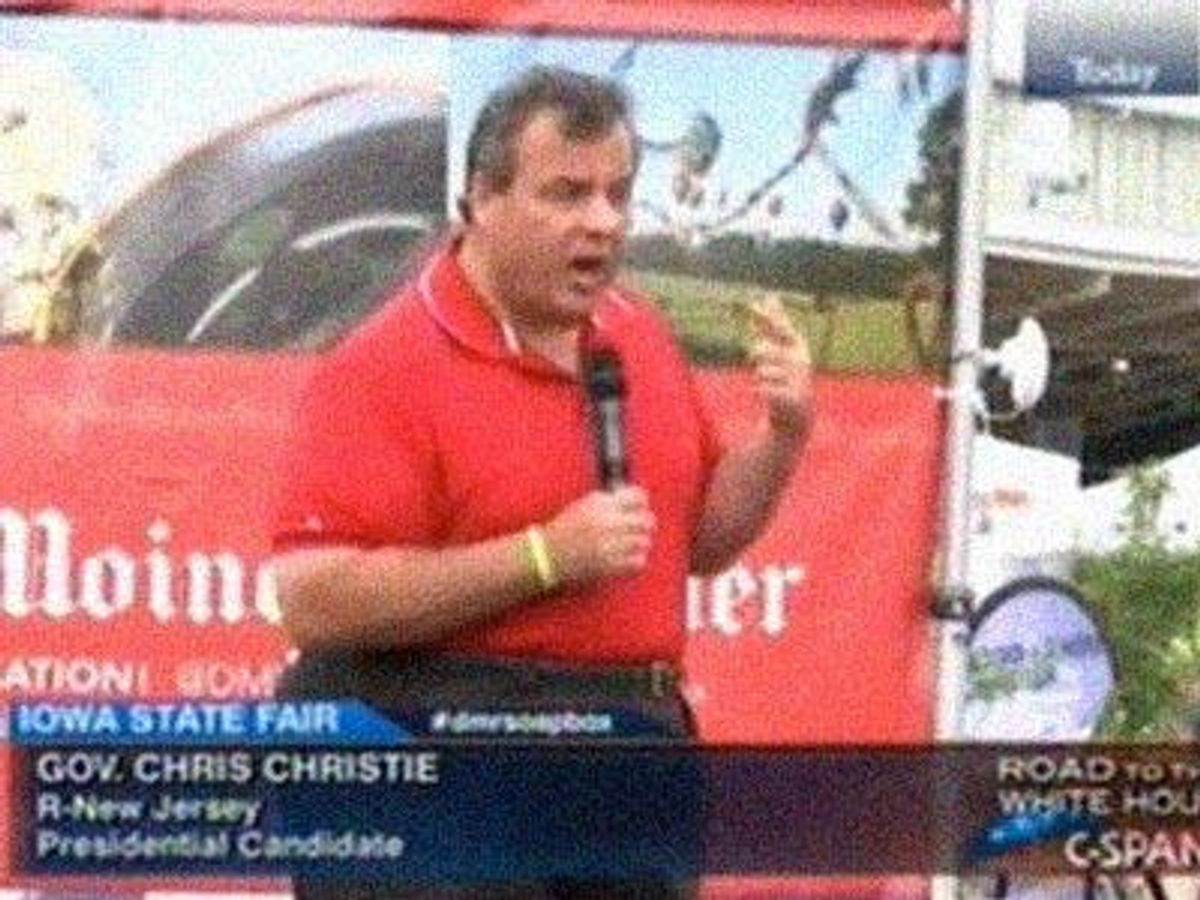New Jersey governor and Republican presidential hopeful Chris Christie stepped outside the standard party line with his response to a question about so-called religious freedom laws that opponents say seek to legalize discrimination against LGBT people.
Speaking at The Des Moines Register's Presidential Soapbox at the Iowa State Fair Saturday, Christie offered a measured response to an attendee's question about whether religious exemptions should allow businesses to discriminate against LGBT people.
"We have a system of laws in this country, and those laws need to be followed," Christie began. "And the fact is, religious organizations should be protected from having to do anything that violates their religious beliefs as a religious organization. That should be protected."
He continued:
"But other businesses who want to do business, they should have to be able to do business under the laws of our country. When I take an oath of office as governor, my oath of office is to enforce the laws of the state of New Jersey. Not the laws I like or the laws that I agree with, but all the laws.
"And if we don't want to have a country of men and women but a country of laws, where everyone is treated equally, that's what we need to do. And so religious organizations absolutely should be protected, everyone should freely practice their religion the way they see fit, but businesses should not be allowed to discriminate, no."
As Zack Ford at ThinkProgress notes, Christie's tempered response to the question that has been, for other GOP candidates, a slam-dunk opportunity to support "religious liberty" and the right to turn away the gays is characteristic of the New Jersey Republican's "mixed record" on LGBT rights.
Notably, Christie was one of the few Republican presidential candidates (though he had not yet formally announced his bid) who declined to support Indiana Gov. Mike Pence's controversial Religious Freedom Restoration Act when that law became the subject of nationwide scrutiny last March. He eventually gave a vague statement expressing his confidence that Pence would find a way to "[fix the law] to clarify that nobody will be denied service for discriminatory reasons." (Pence did sign a so-called fix to the legislation that specified it could not be used to discriminate against LGBT people, though many supporters said the fix was "insufficient.")
But in 2013, Christie's signature made New Jersey only the second state in the country to ban licensed professionals from subjecting minors the discredited practice known as conversion or "ex-gay" therapy, which attempts to make gay and transgender people straight and cisgender (nontrans), respectively. He was lambasted by fellow Republicans for signing legislation that they claimed limited "parental choice," but Christie pointed to the overwhelming preponderance of scientific, medical, and psychological evidence that proves such "therapy" is not only ineffective but harmful to those subjected to it.
Christie also holds the unique distinction of being the only current GOP presidential candidate to veto marriage equality legislation, dragging out his state's fight for equal marriage for nearly two years, before eventually dropping his administration's efforts to appeal pro-equality court decisions in October 2013.
Earlier this month, Christie vetoed -- for the second time -- legislation that would have made it easier for transgender residents of New Jersey to obtain accurate legal identification, citing unsubstantiated concerns about "fraud." On a conservative radio show the following week, Christie could be heard laughing about the veto, in response to a question about whether he had "no compassion for the Caitlyn Jenners of this world."
Just hours before formally announcing his presidential campaign in June, Christie vetoed a bill that sought to protect the parental rights of same-sex couples and other families looking to expand via surrogacy. The legislation, called the Gestational Carrier Agreement Act, had bipartisan support and "would have modernized New Jersey law by giving legal parental rights of a child carried by a gestational surrogate to the intended parent at birth," according to a Human Rights Campaign statement on the bill.



















































































Viral post saying Republicans 'have two daddies now' has MAGA hot and bothered